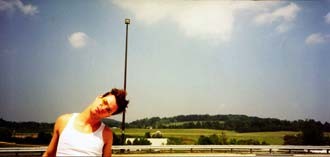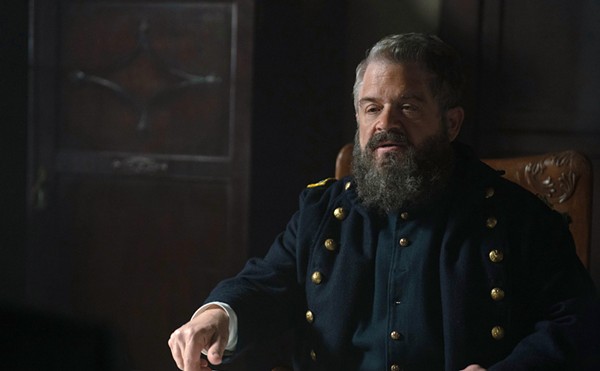|
Jonathan Caouette exhumed a freak-show childhood and made it into a masterpiece "We're a happy family, and we're a wonderful family," insists Adolph Davis. Viewers of his grandson's film, the ultimate home movie about a home that could double for tarnal damnation (Tarnation), might disagree. Adolph's daughter, Renée, was a gorgeous child model who at 12 fell off the roof of their Houston house and into the clutches of mental health monsters who eletro-shocked her twice a week. Over the course of 35 years, she was in and out of hospitals 100 times. When Renée married, her husband abandoned her without ever learning that she was pregnant with their son, Jonathan. Determined to make a fresh start with her little boy, she took him to Chicago, where she was straightaway raped before his eyes. When Renée was later jailed, Jonathan was sent to board with abusive foster parents. Eventually adopted by his peculiar grandparents, whose house he tore apart as often as he could, he staged a suicide attempt almost every week. Enrolled in the Big Brother program, he was paired with a film critic from the Houston Chronicle who took him to screenings instead of ballgames. By the age of 31, when Tarnation begins with the news that Renée has overdosed on lithium, Jonathan Caouette has been putting himself and those around him on film for most of his life. "Thank God for cinema!" exclaimed the director following an advance screening of his film last week at San Antonio College. "It saved my life." Tarnation is an astonishing record of that life, compiled from actual video and Super-8 footage, and from still photos, answering machine messages, video diaries, and dramatic reenactments. Caouette, who was working as a doorman and a waiter in New York City, put the film together with a Macintosh iMovie program at a cost of $218, which can probably buy a toothbrush in a Beverly Hills Dollar Store. During a triumphal tour of film festivals, Tarnation - which Caouette chose over two other working titles, Lucid and The Day I Disappeared - has gained admirers and backers, including filmmakers Gus Van Sant and John Cameron Mitchell, who swelled the budget to $400,000, primarily to pay permission fees for musical and cinematic materials appropriated from popular culture of the '70s and '80s. The film makes effective use of split screens, overlapping, tinted, and shimmering images, negatives, blurred focus, and other visual devices to evoke the state of mind of someone hugging the borderline between waking and dreaming, lucidity and delusion.
"Sick parents raise sick children," says Renée, who is alternately enthralled and appalled by her son's practice of invading their family's privacy with a camera lens. One of the most memorable scenes in the film is an excruciatingly long take in which Renée, her brain damaged but her spirit untethered, sings, babbles, and cavorts before the camera while hugging a pumpkin. An operatic mad scene whose libretto was entirely improvised, it is a moment of sublime agony for the viewer as much as for the deranged woman's son who was holding the camera. Back in Texas after fleeing to New York four years ago, Caouette summarized his escape from a turbulent Houston childhood: "It was like growing up in a religious cult and having to deprogram yourself." Tarnation is an extraordinary act of exorcism. It is a horror film whose director uses cinema to array and slay the monsters that still haunt him. •
|
Tags:

KEEP SA CURRENT!
Since 1986, the SA Current has served as the free, independent voice of San Antonio, and we want to keep it that way.
Becoming an SA Current Supporter for as little as $5 a month allows us to continue offering readers access to our coverage of local news, food, nightlife, events, and culture with no paywalls.
Scroll to read more Movie Reviews & News articles
Newsletters
Join SA Current Newsletters
Subscribe now to get the latest news delivered right to your inbox.














